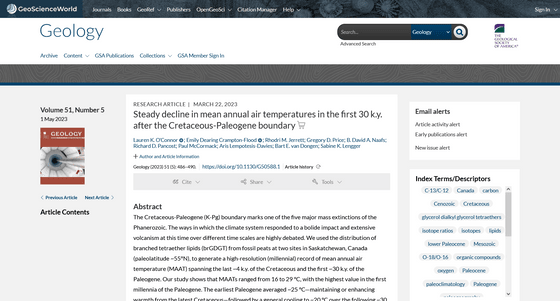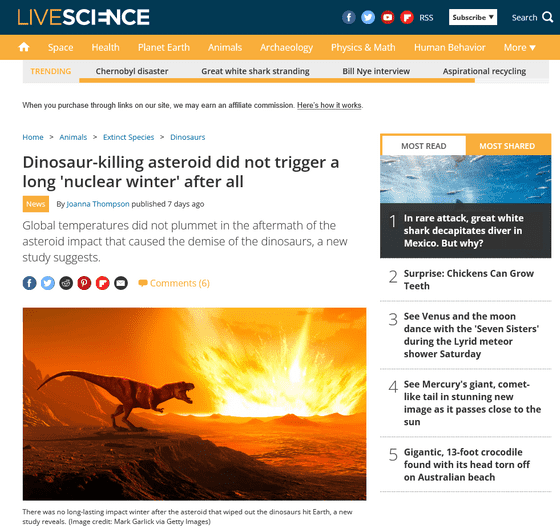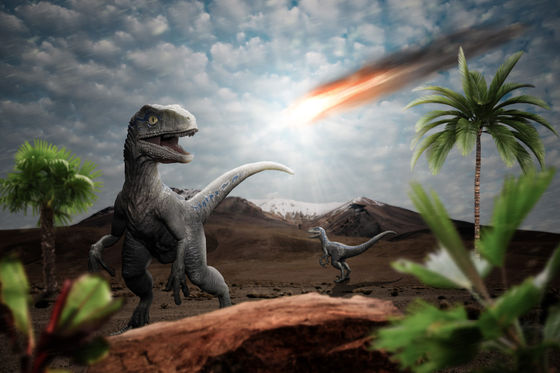It turns out that the giant meteor that made dinosaurs extinct did not cause a ``nuclear winter''

by
Dinosaurs that roamed the earth in ancient times became extinct due to global fires caused by heat waves caused by meteor impacts and rapid cooling caused by particles blown up into the sky blocking sunlight. The theory is believed to be strong. It is thought that this major event that shook the history of life on Earth led to a long-term cold period called ' meteor winter (a phenomenon similar to nuclear winter )', but new research has shown that the cooling is very small. It was determined that it was most likely short-lived.
Steady decline in mean annual air temperatures in the first 30 ky after the Cretaceous-Paleogene boundary | Geology | GeoScienceWorld
https://doi.org/10.1130/G50588.1

Dinosaur-killing asteroid did not trigger a long 'nuclear winter' after all |

In the spring of 66 million years ago, an asteroid with a width of about 10 km fell on the Yucatan Peninsula and changed the landscape of the earth. This meteor impact, called
Advances in simulation technology have made it possible to understand what happened on the day of the impact , but there is no unified view of what the 'meteor winter' was like after the impact. .

In this study, a research team led by Lauren O'Connor, a geoscientist at the University of Utrecht in the Netherlands, analyzed the strata before, during, and after the fall of the rock that created the Chicxulub crater, and analyzed coal samples. conducted a study comparing the fossilized bacteria contained in
The research team focused on bacteria to infer changes in the climate at that time from the ecology that thickens and thins the cell walls according to changes in temperature. O'Connor likens the changes in temperature and bacterial cell walls to ``like putting on and taking off a blanket.''
As a result of analyzing the bacteria, it was found that there was no evidence that the bacteria had thickened their cell walls in preparation for the ``meteor winter'' for thousands of years after the meteorite impact. Moreover, rather than cooling, it has been warming for 5,000 years, and the temperature fluctuations have stabilized at a relatively early stage. The researchers believe this is the result of supervolcanoes releasing carbon dioxide into the atmosphere in the thousands of years leading up to the end of the Cretaceous period.
Regarding this result, Mr. O'Connor said, ``We found no evidence of nuclear winter.At least, from our research, we can not derive that there has been a decrease in temperature for more than 1000 years.'' .

A prolonged 'meteor winter' may not have occurred, but this does not mean that there has been no cooling at all. Sean Gorlick, a geophysicist at the University of Texas at Austin who was not directly involved in the study, told Live Science, ``Ecosystems are affected for such a long period of time. No, because most plants in the world would die if they weren't exposed to sunlight for several months.'
Even if it's only for a few months to a few years, if the sunlight stops, the plants will die and the herbivorous animals will starve to death. If this breaks down the food chain, even larger carnivores will die out. In other words, the cooling caused by the stone that wanted to destroy the dinosaurs may have been a more dramatic and instantaneous event than previously thought.
The results of this study mean that the temperature recovered relatively quickly after the meteor fall, which foreshadows the possibility that the earth can recover from climate change more quickly than previously thought. . The research team plans to investigate coal samples in more locations in the future to investigate the impact of the Chicxulub impactor's fall and volcanic activity.
Learning from the past events that led to the extinction of dinosaurs is expected to deepen our understanding of the climate crisis facing modern humans.
Related Posts:







